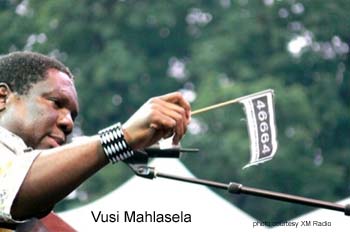Acoustic Africa Review
Acoustic Africa
Old Town School Of Folk Music, Chicago
Saturday, November 4, 2006
With all of the “unplugged†pop performances and “stripped down†rock tours, an acoustic African tour seems a tad ironic. At its core, African music is acoustic anyway so it makes little sense to jump on that bandwagon. Leave it to Putumayo, that harbinger of cutely packaged and easily digestible global music, to do it anyway. The label’s recently released Acoustic Africa, a compilation of mostly West African singer-songwriters, gets a strategic boost with a tour featuring three of the CD’s artists. Although many of them aren’t so well known to Western audiences, two of its most recognizable singers, Mali’s Habib Koité and South Africa’s Vusi Mahlasela, are tour highlights along with Ivory Coast’s Dobet Gnahore, making her American debut.

Based on the tepid, 12-track album, you’d expect a concert that offered up harmonious, gently catchy ditties, a sort of Kumbaya for the new millennium. Surprisingly, there was none of that. Koité headlined with his rousing Malian blues and Gnahore demonstrated her impressive vocal and dancing skills. But it was Mahlasela who stole the show. He’s called simply “The Voice†in South Africa and it takes just one note from his mellifluous instrument to understand why. Nonchalant and witty, the musician combined the hope and emotional power of South Africa’s protest music with a pure joy for singing, proving acoustic does not have to mean lifeless.
Opening with Malian balafon (wooden keyed xylophone) master Keletigui Diabate plunking out a soothing melody alone on stage, Gnahore strolled onstage unannounced. With sandy-blonde locks tucked beneath a woven gold, red, and black woven hat, a gold tank, black shawl, and flowing black pants accented with 3-inch wedges, the young singer looked like the funky/chic, modern griot that she is. Breaking into her husky contralto, she sang with conviction, in one of the nine African languages she performs with. She walked off and Mahlasela walked on, his sizeable frame covered in a black and tan dashiki. Playing an acoustic guitar and humming with such resonance that it sounded like singing, his voice suddenly ripped out in Zulu, soaring and falling in tempo. His eyes closed as he sang, Mahlasela totally commanded the stage. Leaving as he came, the sold-out crowd sat stunned at the spectacle of The Voice.
Gnahore took the stage again, announcing, “I’m tired of politic in Africa. I’m tired of politic in Ivory Coast, my country.†After fleeing the political strife of her country, Gnahore moved to the fertile musical ground of Marseilles, France, where she formed a band of Tunisian and French musicians. The quartet backed her as she sang and played the mbira, their soft melodies a marked contrast to her dynamicism. Tawny, muscular arms rippled with evidence of her years of dancing professionally but if that wasn’t convincing enough, Gnahore slipped out of her wedges and kicked and shimmied in a ferocious traditional dance.
“Welcome to Acoustic Africa, we are bringing musical energy from Mali, South Africa, and Ivory Coast,†said Mahasela after he took the stage again. “This is going to be a night of music, poetry, and dance so have fun.†And so it was. As in the African tradition, all three merged into one and the audience was soon on its feet dancing and singing. Headliner Koité didn’t appear until almost halfway though the two-and-a-half hour show, casually arriving onstage in trademark woven pants and vest, guitar at his side. Easily the most famous of the three performers, he appeared to be literally stepping aside so the other two could win recognition. Rolling into the gliding guitar rhythms that laid the foundation for American blues, Koité played with heartfelt enthusiasm. Mahlasela joined him for a guitar duet, strumming an uptempo tune with Gnahore singing and shaking a kola nut shaker.
With all of Gnahore’s kinetic charisma and Koité’s star power, Mahlasela managed to overtake both with just the sheer power of his voice. Rarely did he push his vocals to full capacity but whenever Mahlasela was onstage with Gnahore and Koité, his was the one that grabbed attention. With elections and political frustration the current focus, Mahasela’s strong legacy of political activism during apartheid also resonated with the crowd. “In South Africa, we’re celebrating 12 years of democracy,†he said. “It’s a very fragile thing and it has to be protected. Your neighbor’s problem is also your problem.†In a song dedicated to the South African women who “refused to dangle in the midst of apartheid,†he guided the audience in chanting, “My song of love, my song of life.â€
But it wasn’t until the two finales that the party really started. All three performers joined in a dance on stage. Not to be upstage by Gnahore’s perfect kicks and gyrations, the two men shook their shoulders in a sexy shimmy that left Gnahore fanning herself. All three glided into Mahasela’s joyful “Africa Sing,†from the Amandla! soundtrack and the crowd responded with dancing in the aisles. Koité’s “No Cigarette’s†kept them there but it was Mahasela’s rendition of Miriam Makeba’s “Pata Pata†that ripped the place up, leaving no room for squeamish dancers or self-conscious singers.
— Rosalind Cummings-Yeates
Category: Live Reviews, Weekly











